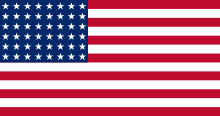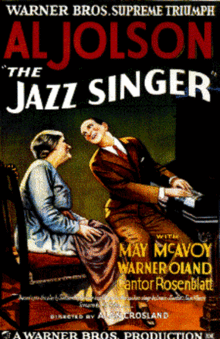1927 in the United States
| 1927 in the United States | |
|---|---|
| Years: | 1924 1925 1926 – 1927 – 1928 1929 1930 |
|
| |
 48 stars (1912–59) | |
|
Timeline of United States history
| |
Events from the year 1927 in the United States.
Incumbents
Federal Government
- President: Calvin Coolidge (R-Massachusetts)
- Vice President: Charles G. Dawes (R-Illinois)
- Chief Justice: William Howard Taft (Ohio)
- Speaker of the House of Representatives: Nicholas Longworth (R-Ohio)
- Senate Majority Leader: Charles Curtis (R-Kansas)
- Congress: 69th (until March 4), 70th (starting March 4)
Events
January–March
- January 7 – The first transatlantic telephone call is made from New York City to London.
- February 23 – The U.S. Federal Radio Commission (later renamed the Federal Communications Commission) begins to regulate the use of radio frequencies.
- March 11
- In New York City, the Roxy Theater is opened by Samuel Roxy Rothafel.
- The first armoured car robbery is committed by the Flatheads Gang near Pittsburgh, Pennsylvania.
April–June
.jpg)
- April 22 – May 5 – The Great Mississippi Flood of 1927 affects 700,000 people in the greatest national disaster in U.S. history at that time.
- May 11 – The Academy of Motion Picture Arts and Sciences, the "Academy" in "Academy Awards," is founded.
- May 14 – In the U.S., the University of Chicago's local collegiate organization, Phi Sigma, becomes incorporated under the laws of the State of Illinois as Eta Sigma Phi, the National Honorary Classical Fraternity.
- May 17 – Army aviation pioneer Major Harold Geiger dies in the crash of his Airco DH.4 de Havilland plane, at Olmsted Field, Pennsylvania.
- May 18 – Bath School disaster: Bombings result in 45 deaths, mostly children, in Bath Township, Michigan.
- May 20–21 – Charles Lindbergh makes the first solo non-stop trans-Atlantic flight, from New York to Paris in the single-seat, single-engine monoplane Spirit of St. Louis.
- May 23 – Nearly 600 members of the American Institute of Electrical Engineers and the Institute of Radio Engineers view the first live demonstration of television at the Bell Telephone Building in New York.
- June 13 – A ticker-tape parade is held for aviator Charles Lindbergh down 5th Avenue in New York City.
July–September
- August 2 – U.S. President Calvin Coolidge announces, "I do not choose to run for president in 1928."
- August 7 – The Peace Bridge opens between Fort Erie, Ontario, and Buffalo, New York.
- August 26 – Paul R. Redfern leaves Brunswick, Georgia, flying his Stinson Detroiter "Port of Brunswick" to attempt a solo non-stop flight to Rio de Janeiro, Brazil. He later crashes in the Venezuela jungle (the crash site is never located).
- September 18 – The Columbia Phonographic Broadcasting System (later known as CBS) is formed and goes on the air with 47 radio stations.
- September 29 – 79 are killed and 550 are injured in the East St. Louis Tornado, the 2nd costliest and at least 24th deadliest tornado in U.S. history.
October–December

October 6: The Jazz Singer.
- October 6 – The Jazz Singer movie opens in the United States and becomes a huge success, marking the end of the silent film era.
- October 8 – Murderer's Row: The New York Yankees complete a 4-game sweep of the Pittsburgh Pirates in the World Series.
- October 28 – Pan American Airways' first flight takes off from Key West, bound for Havana.
- November 3–4 – Floods devastating Vermont incur the "worst natural disaster in the state's history".[1]
- November 4 – Frank Heath and his horse Gypsy Queen return to Washington, D.C., having completed a 2-year journey of 11,356 miles to all 48 states.
- November 10 – Unexplained explosions occur in Canton, Ohio.
- November 12 – The Holland Tunnel opens to traffic as the first Hudson River vehicular tunnel linking New Jersey to New York City.
- November 14 – The Pittsburgh Gasometer Explosion: Three Equitable Gas storage tanks in the North Side of Pittsburgh, Pennsylvania, explode, killing 26 people and causing damage estimated between contemporary totals of $4 million and $5 million.
- December 2 – Following 19 years of Ford Model T production, the Ford Motor Company unveils the Ford Model A as its new automobile.
- December 15 – Marion Parker, 12, is kidnapped in Los Angeles. Her dismembered body is found on December 19, prompting the largest manhunt to date on the West Coast for her killer, William Edward Hickman, who is arrested on December 22 in Oregon.
- December 17 – The U.S. submarine S-4 is accidentally rammed and sunk by the United States Coast Guard destroyer John Paulding off Provincetown, Massachusetts, killing everyone aboard after several unsuccessful attempts to raise the sub.
- December 27 – Kern and Hammerstein's musical play Show Boat, based on Edna Ferber's novel, opens on Broadway and goes on to become the first great classic of the American musical theatre.
Undated
- The Voluntary Committee of Lawyers is founded to bring about the repeal of Prohibition of alcohol in United States.
Ongoing
_(12001959566).jpg)
Menu, Ye Bull Pen Inn, Los Angeles, 1927
- Lochner era (c. 1897 – c. 1937)
- U.S. occupation of Haiti (1915–1934)
- Prohibition (1919–1933)
- Roaring Twenties (1920–1929)
Births
- January 10 – Johnnie Ray, singer, pianist and songwriter (d. 1990)
- January 13 – Brock Adams, U.S. Senator from Washington from 1987 to 1993 (d. 2004)
- January 17 – Harlan Mathews, U.S. Senator from Tennessee from 1993 to 1994 (d. 2014)
- January 24 – Paula Hawkins, U.S. Senator from Florida from 1981 to 1987 (d. 2009)
- January 28 – Vera Williams, author and illustrator
- January 29 – Gerald D. Klee, psychiatrist and academic (d. 2013)
- February 1 – Galway Kinnell, poet
- February 6 – William Gardner Smith, novelist and journalist
- February 18 – John Warner, U.S. Senator from Virginia from 1979 to 2009
- February 21 – Erma Bombeck, humorist (d. 1996)
- February 22 – Donald May, actor
- February 25 – Ralph Stanley, bluegrass banjo player and vocalist (d. 2016)
- March 7 – James Broderick, actor (d. 1982)
- March 13 – Robert Denning, interior designer (d. 2005)
- March 18 – George Plimpton, writer and actor (d. 2003)
- March 29 - John Mclaughlin, television and radio host, former Jesuit priest and adviser to President Nixon (d. Washington, D.C., United States
- April 10 – Marshall Warren Nirenberg, biochemist and geneticist, recipient of Nobel Prize in Physiology or Medicine in 1968 (d. 2010)
- April 16 – John Chamberlain, sculptor (d. 2011)
- May 10 – Mike Souchak, golfer (d. 2008)
- May 13 – Fred Hellerman, folk singer (d. 2016)
- May 25 – Robert Ludlum, novelist (d. 2001)
- June 8 – Jerry Stiller, actor, husband of actress Anne Meara and father of actor Ben and of actress Amy Stiller
- June 19 – John Glenn Beall, Jr., U.S. Senator from Maryland from 1971 till 1977 (d. 2009)
- June 23 – Bob Fosse, choreographer (d. 1987)
- July 4 – Neil Simon, playwright
- July 7
- Alan Dixon, U.S. Senator from Illinois from 1981 to 1993 (d. 2014)
- Charlie Louvin, country singer and songwriter (d. 2011)
- Doc Severinsen, jazz trumpeter
- July 9 – Ed Ames, singer and actor (Ames Brothers)
- July 14 – Mike Esposito, comic book artist
- July 16 – Mindy Carson, singer
- July 18 – Don Bagley, bassist (d. 2012)
- July 27 – Guy Carawan, folk musician and musicologist (d. 2015)
- August 7 – Carl Switzer, actor (d. 1959)
- August 9 – Marvin Minsky, computer scientist, Turing Award winner (Artificial intelligence) (d. 2016)
- August 18 – Rosalynn Carter, wife of Jimmy Carter, First Lady of the United States
- August 19 – Jim Broyhill, U.S. Senator in 1986
- August 23 – Allan Kaprow, painter and performance artist (d. 2006)
- September 4 – John McCarthy, computer and cognitive scientist (d. 2011)
- September 30 – W. S. Merwin, poet
- October 20 – Joyce Brothers, popular psychologist (d. 2013)
- November 8 – Patti Page, singer (d. 2013)
- November 23 – Guy Davenport, writer and graphic artist (d. 2005)
- December 13 – James Wright, poet (d. 1980)
- December 23 – Edith Irby Jones, b. Edith Mae Irby, African American physician
- December 24 – Mary Higgins Clark, novelist
Deaths
- January 26 – Lyman J. Gage, financier and Presidential Cabinet Officer (b. 1836)
- February 7 – Walter Guion, U.S. Senator from Louisiana in 1918 (b. 1849)
- February 25 – David Baird, U.S. Senator from New Jersey from 1918 to 1919 (b. 1839 in Ireland)
- March 11 – August Paulsen, Danish-American businessman and philanthropist (b. 1871)
- June 9 – Victoria Woodhull, American leader of the woman's suffrage movement (died 1838)
- June 15 – William Joseph Deboe, U.S. Senator from Kentucky from 1897 to 1903 (b. 1849)
- August 15 – B. B. Comer, 33rd Governor of Alabama from 1907 to 1911 and U.S. Senator from Alabama in 1920 (b. 1848)
See also
References
External links
-
 Media related to 1927 in the United States at Wikimedia Commons
Media related to 1927 in the United States at Wikimedia Commons
This article is issued from Wikipedia - version of the 11/17/2016. The text is available under the Creative Commons Attribution/Share Alike but additional terms may apply for the media files.